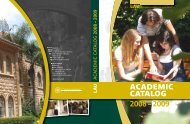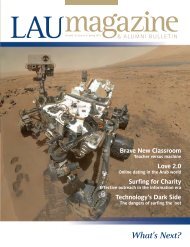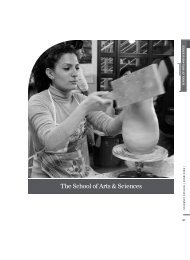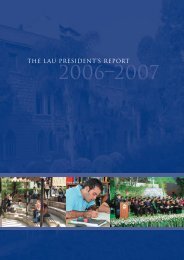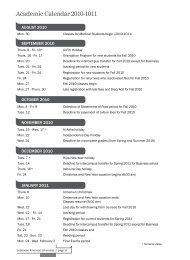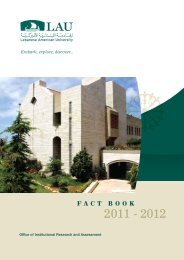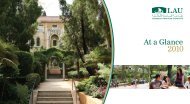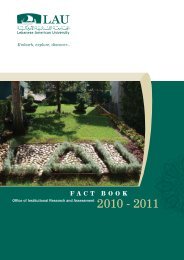academic-catalog2011.. - LAU Publications - Lebanese American ...
academic-catalog2011.. - LAU Publications - Lebanese American ...
academic-catalog2011.. - LAU Publications - Lebanese American ...
You also want an ePaper? Increase the reach of your titles
YUMPU automatically turns print PDFs into web optimized ePapers that Google loves.
Department of Natural Sciences<br />
southern blotting, DIG probe labeling, microsatellite<br />
typing, DNA sequencing, DNA subcloning<br />
coupled with bacterial transformation,<br />
transcriptional expression techniques using<br />
galactosidase reporter gene assays, and<br />
identification of bacterial species using the<br />
Biolog®System.<br />
BIO820 Applied and Industrial Microbiology<br />
[2-3, 3 cr.]<br />
This course deals with industrial<br />
microorganisms and their application in the<br />
industrial process for the large scale production<br />
of antibiotics, vitamins, amino-acids, enzymes,<br />
and organic acids. It also deals with microbial<br />
bioconversions, and the production of food<br />
from microorganisms, sewage, and wastewater<br />
microbiology, as well as the applications of<br />
genetically engineered microorganisms to<br />
obtain novel products.<br />
BIO822 Advanced Molecular Biology [3-0, 3 cr.]<br />
This course emphasizes the principles and<br />
information which form the contemporary<br />
basis for molecular biology. The course<br />
covers the subjects of prokaryotic molecular<br />
genetics, RNA and DNA biosynthesis, protein<br />
biosynthesis, DNA recombination, regulation<br />
of gene expression, eukaryotic molecular<br />
genetics, RNA and DNA viruses, oncogenes,<br />
attenuation, global control, signal transduction,<br />
and two-component regulatory systems.<br />
BIO825 Diagnostic Microbiology and<br />
Immunology [2-3, 3 cr.]<br />
This course covers the biochemical,<br />
serological, and automated, methods used<br />
in the laboratory diagnosis of infectious<br />
diseases. The laboratory part of the course<br />
allows for a better understanding through<br />
application. Topics include the monoclonal<br />
antibody production, detection of fluorescent<br />
antibodies, enzyme-linked immunosorbent<br />
assay, radioimmunoassay, gas-liquid<br />
chromatography, high performance liquid<br />
chromatography, mass spectrometry, timeresolved<br />
immunofluorescence, nucleic acid<br />
probes in clinical diagnostics, and diagnostic<br />
virology and parasitology.<br />
BIO826 Advances in Cell Biology [3-0, 3 cr.]<br />
This course deals mainly with the most recent<br />
advancement in cell biology, i.e. stem cell<br />
research, and its applications in therapy. The<br />
course deals with embryonic stem cells, adult<br />
stem cells, and the umbilical cord stem cells. It<br />
discusses the potential fate of such cells, their<br />
molecular characteristics, and their isolation,<br />
culturing, and identification techniques.<br />
Stem cell application in animal and human<br />
tissue and organ repair, such as in the brain,<br />
heart, blood, and pancreas, are thoroughly<br />
investigated. Student presentations on<br />
the most recent case studies on stem cell<br />
applications are covered.<br />
BIO829 Endocrinology and Metabolism<br />
[3-0, 3 cr.]<br />
This course covers the study of biochemical<br />
messengers, integrators, and coordinators<br />
of general, developmental, and physiological<br />
processes with stress on metabolic<br />
mechanisms. It deals with biosynthesis,<br />
secretion, mechanisms of action and<br />
bioactivities of the hormones, as well as<br />
diagnostic technologies.<br />
BIO834 Environmental Health and Toxicology<br />
[3-0, 3 cr.]<br />
This course is an introduction to the<br />
methodology of practical control of the<br />
environmental factors that affect disease,<br />
disorders, and health. It deals with the<br />
physical environmental stresses, and relates<br />
to biological factors and vectors. It covers<br />
an overall view of the general principles of<br />
toxicology: environmental contamination,<br />
pollution, and their routes and pathways.<br />
BIO835 Microbial Pathogenesis [3-0, 3 cr.]<br />
This course focuses on model microbial<br />
systems, to comprehensively illustrate the<br />
mechanisms of microbial pathogenesis. It<br />
aims at providing a thorough understanding of<br />
bacterial physiology, host defense mechanisms,<br />
general principles of microbial pathogenesis,<br />
adhesion and invasion strategies, intracellular<br />
survival strategies, antibiotic resistance, and<br />
bacterial toxins.<br />
BIO841 Molecular Physiology [3-0, 3 cr.]<br />
This course is an in-depth consideration, and<br />
a theoretical analysis, of the physiological<br />
aspects of body organization, regulation,<br />
integration, maintenance, and continuity, with<br />
special emphasis on the modern application<br />
of knowledge in the domain of physiology, as<br />
related to the normal and upset homeostasis.<br />
BIO845 Diagnostic and Applied Physiology<br />
[3-0, 3 cr.]<br />
This course covers an in-depth application of<br />
molecular physiology, as utilized in a practical<br />
way to better understand, and approach,<br />
the physiology and diagnosis of diseases<br />
on one hand, and for practical analyses of<br />
research projects, as needed by the applicable<br />
physiological hypothesis, on the other.<br />
ACADEMIC CATALOG [ 2011-2012 ] SCHOOL OF ARTS AND SCIENCES<br />
179



